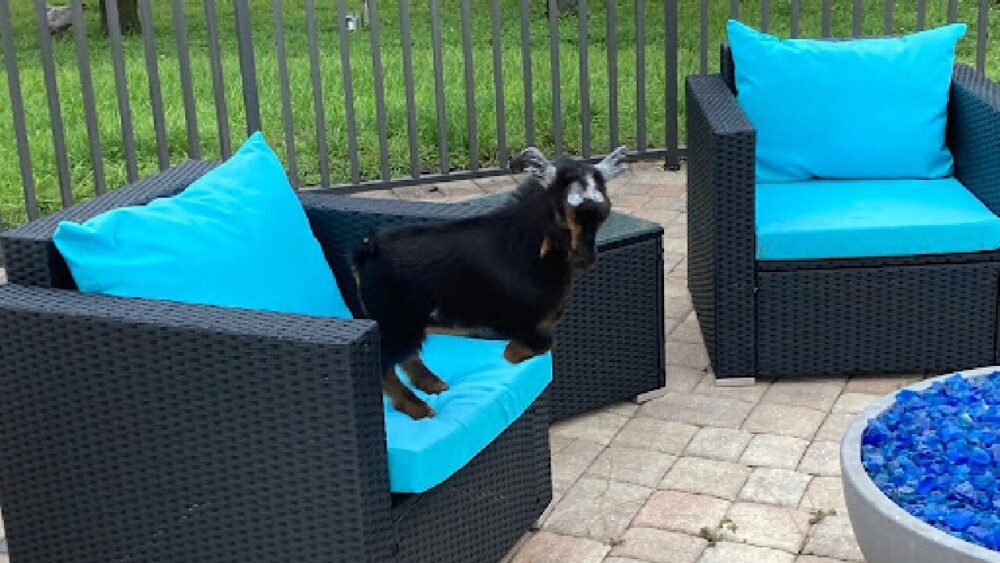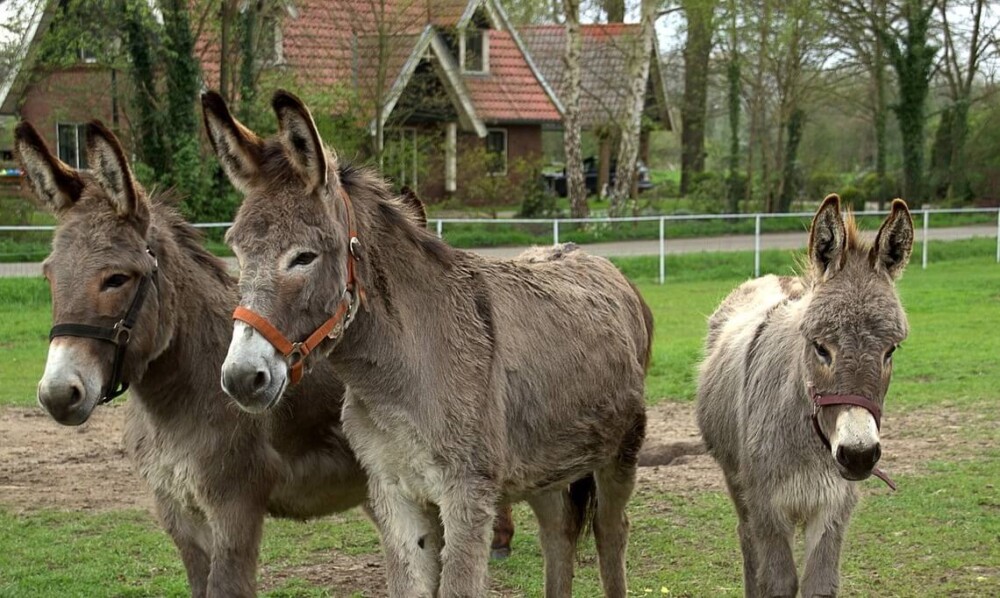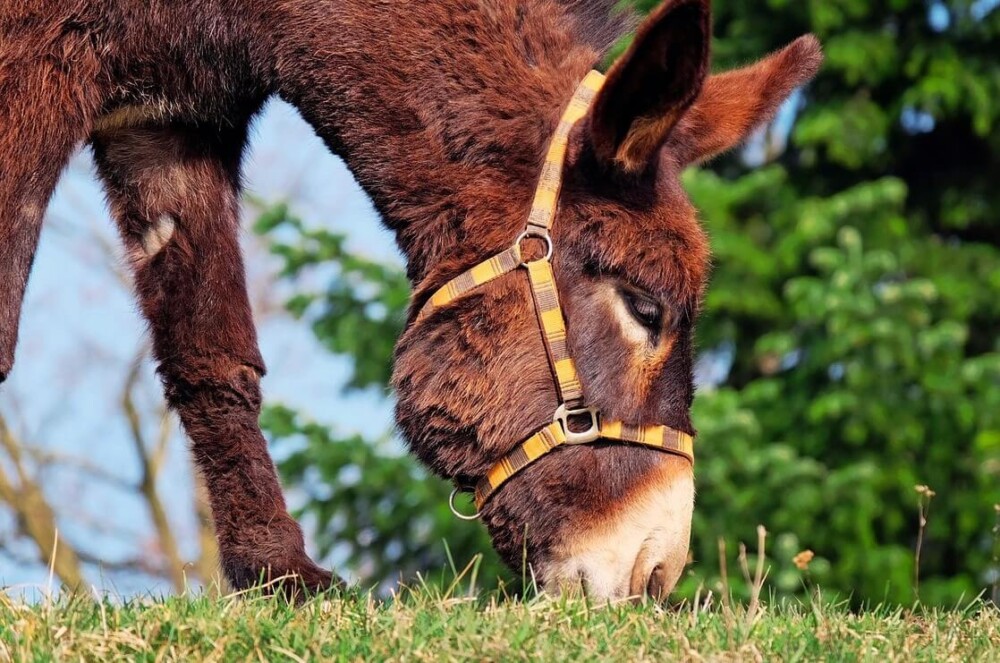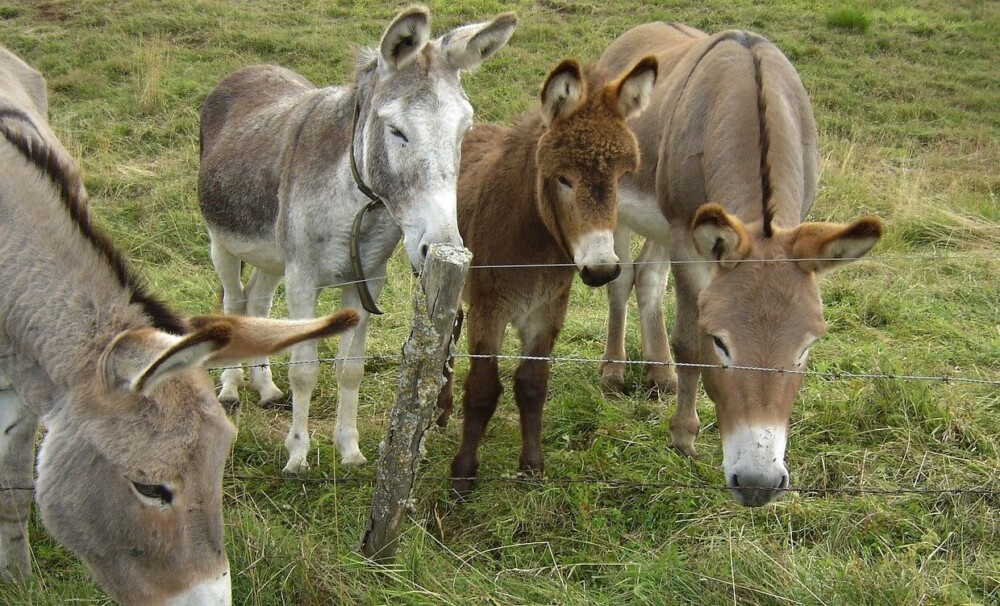Before I moved to the country, I didn’t know much about donkeys. Now, I have space and many neighbors with donkeys. As I have looked into donkeys, I’ve wondered how much space they need. It’s important to provide animals with adequate space, so they have good health and happy life. Here’s what I found out after talking to many of my friends who are donkey owners.
How much space do donkeys need? Donkeys need an average of one acre per standard-sized donkeys. Two donkeys can manage on an acre but will usually try to get out more frequently and may need some hay supplement, depending on the richness of the pasture. Miniature donkeys can exercise and graze a 0.5 acre. Additionally, each donkey needs at least 50 square feet of sheltered space. Miniature donkeys need 40 square feet of shelter.
If donkeys are stabled and do not have access to a pasture for grazing, the shelter needs to be closer to 100 square feet per donkey. Stabled donkeys need additional opportunities for exercise.
3 Things To Consider When Deciding About Space For Your Donkey
Donkeys need adequate space for exercise and grazing. While miniature donkeys can thrive on a full half-acre for grazing, it is inadequate for standard-sized donkeys. It’s also important to note that if you have a ½ acre lot, that’s not all accessible to your donkey as your house and garage will take up a portion of that land.
Standard donkeys can do ok on a half-acre, but it’s important to know that donkeys need a companion donkey. They can do ok with another animal if raised together from their youth. But, if a donkey isn’t used to another animal as a companion, they will struggle without another donkey friend.
That means you need to plan on having enough space for both of your donkeys. If you have an acre, it is possible to raise donkeys, but you might consider a pair of miniature donkeys.
You will also want to make sure that your donkeys don’t have too high of feed quality. In the USA and other developed countries, donkeys face an overheating problem. They need to eat 1.5% of their body weight, but the majority of that, about 75%, should be straw. It’s not necessary or recommended to keep your donkey on a high-quality pasture.
Keeping a Backyard Donkey
Backyards have many sizes and definitions. Donkeys will not generally do well on a 0.25 or 0.33-acre backyard. It isn’t enough space for them. Yet, a ¼ or a ⅓ of an acre is considered a good-sized backyard in the city. But, that is too little space to keep a donkey long-term.
If you have at least a full acre of available land, keeping two donkeys is possible. Remember that you should not keep donkeys alone. But there are other considerations before you decide to keep donkeys in your backyard.
- Zoning requirements: In many municipalities, zoning ordinances limit the allowed animals kept on a property. Donkeys are usually not an allowed animal. Make sure that your zoning and local ordinances allow donkeys to be kept.
- Check the actual available space: Don’t go off of your total acres for your property. Instead, make sure you’ve measured the space your donkeys will be using to ensure there is adequate space.
- Double the Space for Companions: Donkeys absolutely need at least one companion. They will suffer from extreme stress, depression, and behavioral issues. You will need to make sure you have enough space for two donkeys because even with a companion, they will fight and have issues if your donkeys are stressed about the confinement.
- Backyard Setup: This should be a no-brainer, but your backyard should be similar to a pasture with grass and vegetation. It should not be paved, cemented, or have a landscape full of rocks.
- Consider the Shelter: Donkeys need at least 40-50 square feet of sheltered area. Make sure that your backyard has an adequate shed or barn to protect your donkeys from the elements.
- Fencing: You will need to have adequate fencing to keep your donkey contained—the smaller space, the more time your donkey will spend figuring out how to escape. In one survey we conducted at BestFarmAnimals.com, we found that one of the top 5 challenges of owning donkeys was that they are so smart they will open locks.
- Parasite Control: When donkeys are confined in smaller spaces, they are much more prone to parasites. You will need to maintain an active parasite program, including cleaning out their dung on a weekly or bi-weekly schedule.
- Plant Life Challenges: Expect to have your bushes, trees, and other plant life struggle after you house donkeys. They will eat EVERYTHING. If you don’t have enough space to rotate your donkeys, plantlife will struggle.
- Noise Concerns: If you have close neighbors, you may have issues with the fairly consistent braying. Most donkey owners report that noise is not an issue, but that’s likely because they have adequate space. A backyard will place your donkey in closer proximity to others in the area.
Tips For Keeping Your Donkey In Your Backyard
- Get miniature donkeys instead of full-sized
- Make sure to remove poisonous plants and weeds
- Keep your backyard fences tight
- Build a shelter or hideaway in case of rain or extreme cold weather
- Use heat lamps and cold coverings in winter
- Add enrichment activities to keep your donkey happy (try toys)
Keeping Your Donkey On Open Pasture
Grazing your donkeys on a pasture or a field is the most popular way to keep donkeys. It provides them with more space, and the majority of their food can be supplied through grazing. Donkeys should be given an acre per donkey but can do with 2 donkeys on an acre and a half.
Additionally, if you have multiple padlocks or fields that you can rotate your donkeys through, then two donkeys on one acre is sufficient. Rotate donkeys every 4-6 weeks and allow pastures to rest for 12 weeks.
If your land is rich with alfalfa, high-quality grass, or other high-protein and high-calorie plants, then make sure that you supplement your donkey’s diet with straw. Straw and calorie deficient foods roughage should make up about 75% of your donkey’s daily diet.
Donkeys need at least 40-50 square feet of shelter from the elements. They do not have an oil layer that protects them from rain like horses, so shelter is critical. This helps to eliminate the risk of hoof rot and keep them dry, cool, and healthier.
- Rotational Grazing
- Straw Supplement
- Keep 2 or more donkeys at a time
- Adequate space helps to mitigate worm and parasite issues
- Shelter
Stabling Your Donkey
There may be times when you need to stable your donkey. Make sure that you provide enough space for a contained donkey. Donkeys need at least 40-50 square feet of sheltered space if they have additional access to more space in a pasture. When a donkey is confined in a stable, they should have regular access to more space.
How much space do stabled donkeys need? As a general rule, donkeys confined in a stable need at least 100 square feet of confined space to function. They also need regular access to exercise, be provided with limited feed that is 75% straw, and donkey toys to keep them entertained.

Tips For Keeping Your Donkey In A House
- Keep the floors and bedding dry at all times
- Use a hay net to keep food off the ground
- Do not overfeed your donkeys
- Let them outside regularly to keep them in shape
Conclusion
Donkeys are fun animals to have and make great companions. But, inadequate space will cause many headaches, troubles, and other issues. If you don’t have adequate space for a donkey, don’t despair. You may be able to still interact with donkeys. Some areas offer donkey and horse rentals or consider volunteering with a local donkey sanctuary.
Owning a donkey is a life-long commitment, and how much room they get will determine their state of well-being. Take your time to research your options, if necessary, speak to your veterinarian, and then make your final decision.
You may be interested in these related articles.
Pros and Cons of Owning Donkeys Given by 285 Donkey Owners
Donkey Breeding Ages: A Guide to Safe Reproduction
My Favorite Equine Resources For Horses and Donkeys
This list contains affiliate products. Affiliate products do not cost more but helps to support BestFarmAnimals and our goal to provide farm animal owners with accurate and helpful information.
Squeaky Chicken Toy is hilarious to watch and the horses love it! It’s not super tough so keep it away from dogs.
Dewormer with Ivermectin: I use this for my horses and my goats. Duvet makes a great dewormer. I switch between the Ivermectin one and one like this one so the worms don’t get immune to it.
Manna Pro Apple Flavored Nuggets are a delicious smelling treat that my horses go crazy over.
Equinity Amino Acid Supplement for Horses makes a big difference for any horse that’s struggling with arthritis, hoof issues, or just generally. It’s great for older horses who can’t absorb all the nutrients in their food as well!
Manna Pro Weight Accelerator helps older horses gain weight and stay healthier! This was especially helpful when one of my older horses lost weight over the winter and helped her regain her weight over the summer!
Farnam Fly Control goes on the horse or donkey and will keep the flies off your sweet pet. It makes horses way more comfortable and will keep sores from getting infected as well.
Wound Kote protects sores and wounds. It acts as an antiseptic and helps wounds heal faster. It works on both my horses and goats.



